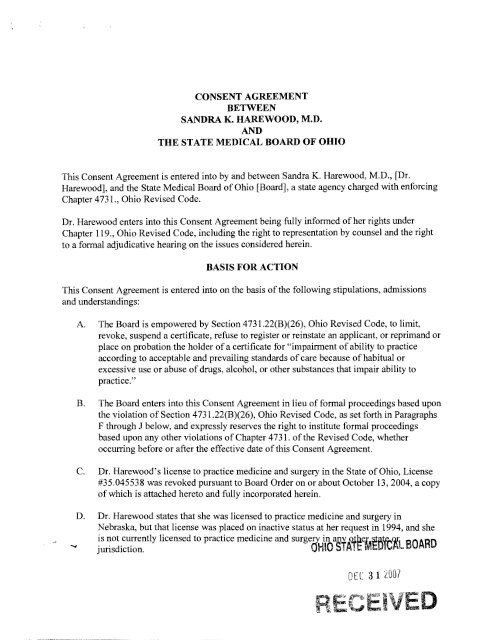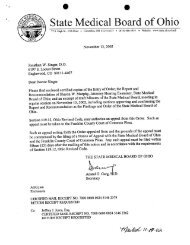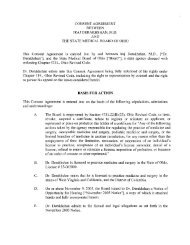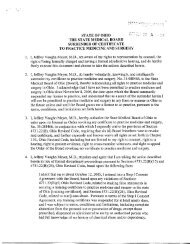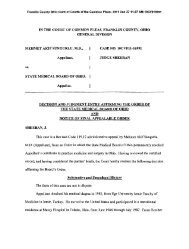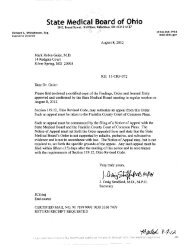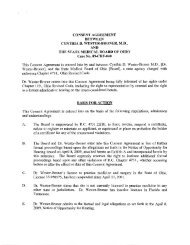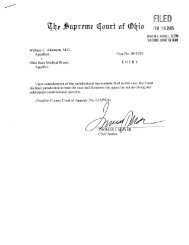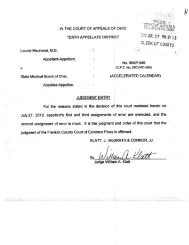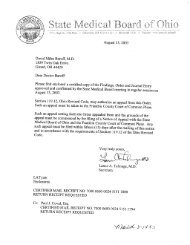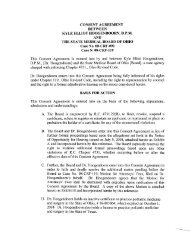Untitled - State Medical Board of Ohio - State of Ohio
Untitled - State Medical Board of Ohio - State of Ohio
Untitled - State Medical Board of Ohio - State of Ohio
Create successful ePaper yourself
Turn your PDF publications into a flip-book with our unique Google optimized e-Paper software.
Report and Recommendation<br />
In the Matter <strong>of</strong> Sandra Kay Harewood, M.D.<br />
Page 2<br />
<strong>Board</strong> advised Dr. Harewood <strong>of</strong> her right to request a hearing in this matter. (<strong>State</strong>’s<br />
Exhibit 1I)<br />
On April 20, 2004, Ms. Collis submitted a written hearing request on behalf <strong>of</strong><br />
Dr. Harewood. (<strong>State</strong>’s Exhibit 1J)<br />
C. By Entry dated May 3, 2004, the matters set forth in the February 11, 2004, notice <strong>of</strong><br />
opportunity for hearing and the April 14, 2004, notice <strong>of</strong> opportunity for hearing were<br />
consolidated for hearing. (St. Ex. 1L)<br />
II. Appearances<br />
A. On behalf <strong>of</strong> the <strong>State</strong> <strong>of</strong> <strong>Ohio</strong>: Jim Petro, Attorney General, by Rebecca J. Albers,<br />
Assistant Attorney General.<br />
B. On behalf <strong>of</strong> the Respondent: Elizabeth Y. Collis, Esq.<br />
I. Testimony Heard<br />
A. Presented by the <strong>State</strong><br />
EVIDENCE EXAMINED<br />
1. Danielle Bickers<br />
2. Teresa Meyer<br />
3. Sandra Kay Harewood, M.D., as upon cross-examination<br />
B. Presented by the Respondent<br />
Sandra Kay Harewood, M.D.<br />
II. Exhibits Examined<br />
A. Presented by the <strong>State</strong><br />
1. <strong>State</strong>’s Exhibits 1A through 1P: Procedural exhibits.<br />
2. <strong>State</strong>’s Exhibit 2: Certified copies <strong>of</strong> documents maintained by the <strong>Board</strong><br />
concerning Dr. Harewood. [Note: The Hearing Examiner numbered the pages<br />
post hearing.]<br />
3. <strong>State</strong>’s Exhibit 3: Copy <strong>of</strong> an April 6, 2004, toxicology report.
Report and Recommendation<br />
In the Matter <strong>of</strong> Sandra Kay Harewood, M.D.<br />
Page 3<br />
4. <strong>State</strong>’s Exhibit 4: Certified copies <strong>of</strong> documents concerning Dr. Harewood<br />
maintained by the Kettering Municipal Court in Kettering, <strong>Ohio</strong>.<br />
5. <strong>State</strong>’s Exhibit 5: Not presented or admitted.<br />
6. <strong>State</strong>’s Exhibit 6: Certified copies <strong>of</strong> documents concerning Dr. Harewood<br />
maintained by the Miamisburg Municipal Court. [Note: The Hearing Examiner<br />
redacted a Social Security number from this document post hearing.]<br />
7. <strong>State</strong>’s Exhibit 7: Certified copies <strong>of</strong> documents concerning Dr. Harewood<br />
maintained by the Miami Township Police Department. [Note: The Hearing<br />
Examiner numbered the pages post hearing.]<br />
B. Presented by the Respondent<br />
1. Respondent’s Exhibit A: Dr. Harewood’s Curriculum Vitae.<br />
2. Respondent’s Exhibit B: Copy <strong>of</strong> a June 1, 2004, letter to <strong>Board</strong> staff from<br />
Gregory B. Collins, M.D., Section Head, Alcohol and Drug Recovery Center,<br />
The Cleveland Clinic Foundation, with attached Treatment and Recovery<br />
Contract executed by Dr. Harewood on May 26, 2004.<br />
3. Respondent’s Exhibits C1 and C2: June 22, 2004, letter to Dr. Harewood’s<br />
attorney from Barron Farrier, CCDC III, Case Manager, <strong>Ohio</strong> Physicians<br />
Effectiveness Program; and attached confidential Advocacy Contract executed<br />
by Dr. Harewood on December 14, 2001. [Note: <strong>State</strong>’s Exhibit C2 has been<br />
sealed to maintain the confidentiality <strong>of</strong> substance abuse treatment records.]<br />
4. Respondent’s Exhibit D: Copies <strong>of</strong> logs <strong>of</strong> Dr. Harewood’s attendance<br />
at recovery program meetings from March 27, 2003, through June 27, 2004.<br />
[Note: This exhibit has been sealed to protect the confidentiality <strong>of</strong> meeting<br />
attendees.]<br />
5. Respondent’s Exhibit E: Copies <strong>of</strong> documents certifying Dr. Harewood’s<br />
attendance at CME programs.<br />
6. Respondent’s Exhibit F: Copy <strong>of</strong> Dr. Harewood’s conditions <strong>of</strong> probation as<br />
required by the Miamisburg Municipal Court effective November 12, 2003.<br />
[Note: The Hearing Examiner redacted a Social Security number from this<br />
document post hearing.]
Report and Recommendation<br />
In the Matter <strong>of</strong> Sandra Kay Harewood, M.D.<br />
Page 4<br />
SUMMARY OF THE EVIDENCE<br />
All exhibits and transcripts <strong>of</strong> testimony, even if not specifically mentioned, were thoroughly<br />
reviewed and considered by the Hearing Examiner prior to preparing this Report and<br />
Recommendation.<br />
1. Sandra K. Harewood, M.D., obtained her medical degree in 1977 from The <strong>Ohio</strong> <strong>State</strong><br />
University School <strong>of</strong> Medicine. From July 1977 through June 1978, Dr. Harewood<br />
participated in an internship in internal medicine at Mount Carmel <strong>Medical</strong> Center in<br />
Columbus, <strong>Ohio</strong>. From July 1978 through June 1980, Dr. Harewood completed a residency<br />
in internal medicine at Creighton University in Omaha, Nebraska. She was board certified<br />
by the American <strong>Board</strong> <strong>of</strong> Internal Medicine in 1983. (Respondent’s Exhibit [Resp. Ex.] A;<br />
Hearing Transcript [Tr.] at 28-29)<br />
Dr. Harewood was licensed to practice medicine in <strong>Ohio</strong> in 1980. Dr. Harewood’s<br />
Curriculum Vitae also states that she was licensed to practice medicine in Nebraska from<br />
1979 through 1992. (Resp. Ex. A)<br />
Dr. Harewood’s practice history includes that, from 1983 through 1991, she was the Director<br />
<strong>of</strong> Internal <strong>Medical</strong> Education at the Family Practice Residency Program at St. Elizabeth’s<br />
<strong>Medical</strong> Center in Dayton, <strong>Ohio</strong>. From 1991 through 1994, she was an Associate Pr<strong>of</strong>essor<br />
<strong>of</strong> Medicine in the Internal Medicine Department at Wright <strong>State</strong> University School <strong>of</strong><br />
Medicine. Dr. Harewood testified that, subsequently, for about one and one-half years, she<br />
was not employed; however, she stated that she remained active at Wright <strong>State</strong> University<br />
during that time and was on their admissions committee. (Resp. Ex. A; Tr. at 30-31)<br />
In March 1996, Dr. Harewood became Associate Director <strong>of</strong> Student Affairs at Wright<br />
<strong>State</strong> University School <strong>of</strong> Medicine. Subsequently, on November 30, 1996,<br />
Dr. Harewood’s husband was killed in an airplane crash. Dr. Harewood testified, “I really<br />
did not return to that position after he died, and I didn’t resign immediately. I mean, I tried<br />
to go back some but just was not able to focus on that. I did return and did some outpatient<br />
precepting through June <strong>of</strong> [1997].” (Resp. Ex. A; Tr. at 31, 52)<br />
Finally, from September 1997 through September 2001, Dr. Harewood worked in the private<br />
practice <strong>of</strong> internal medicine in Waynesville, <strong>Ohio</strong>; and for Alliance Physicians in Kettering,<br />
<strong>Ohio</strong>. In September 2001, Dr. Harewood took leave from her work to obtain an evaluation<br />
and subsequent treatment for alcohol abuse and depression. Dr. Harewood testified that she<br />
has not worked as a physician since that time. (Resp. Ex. A; Tr. at 31-32, 84-85)<br />
2. Dr. Harewood testified that her license to practice medicine in <strong>Ohio</strong> had been suspended in<br />
August 2002 pursuant to a Step I Consent Agreement with the <strong>Board</strong>, and has not been<br />
reinstated. (Tr. at 48-49)<br />
3. Dr. Harewood testified that her husband had been an anesthesiologist who practiced in Xenia,<br />
<strong>Ohio</strong>. Dr. Harewood further testified that, during Thanksgiving weekend in 1996, she and her
Report and Recommendation<br />
In the Matter <strong>of</strong> Sandra Kay Harewood, M.D.<br />
Page 5<br />
children had been staying with her parents in Shelby, <strong>Ohio</strong>. Her husband, who was an<br />
instrument-rated pilot, had the use <strong>of</strong> an airplane that he kept at Greene County Airport in<br />
Xenia. On the Saturday <strong>of</strong> Thanksgiving weekend, Dr. Harewood’s husband flew from<br />
Greene County Airport to meet the family at Mansfield Airport. However, his plane crashed<br />
en route and he was killed. (Tr. at 50-53)<br />
Dr. Harewood testified that she has three children who had been in middle school and high<br />
school at the time <strong>of</strong> her husband’s death. Dr. Harewood further testified that she had been<br />
working about twenty to twenty-five hours per week at that time. (Tr. at 49-50)<br />
4. Dr. Harewood testified that, at the time her husband died, her family had lived in a large<br />
home and owned three cars. However, at a memorial service held for her husband in Xenia,<br />
Dr. Harewood received the first hint that something was amiss concerning her family’s<br />
financial situation. Dr. Harewood attended the service with her family attorney, and was<br />
approached by a young woman who expressed her sympathy and added, “‘I have notarized<br />
your signature so many times, and I have never met you.’” Dr. Harewood testified, “[O]ur<br />
jaws just kind <strong>of</strong> dropped, and that was really the first inkling I had. And we followed up on<br />
it, my attorney then even pulled papers that she had given my husband to have me sign; and,<br />
indeed, it was not my signature.” (Tr. at 54-55)<br />
Dr. Harewood testified that she subsequently learned that her family’s financial situation<br />
“was very bad.” Dr. Harewood further testified that her husband had forged her signature<br />
on a number <strong>of</strong> financial and legal documents, including a large second mortgage on their<br />
home. Moreover, Dr. Harewood’s husband had liquidated her IRA. Dr. Harewood<br />
testified, “So the home and automobiles, all <strong>of</strong> my IRA, his pension and pr<strong>of</strong>it sharing,<br />
there was nothing. And his business, he had even had to get a personal loan and forged my<br />
signature on loan papers for his business as well.” (Tr. at 50-51)<br />
5. Dr. Harewood testified that she and her children had moved into a smaller home in 1997.<br />
“I did not make enough to cover even the utility payments on the other house, much less<br />
* * * the two mortgages.” Dr. Harewood testified that, even after downsizing the family<br />
home, she had been under a lot <strong>of</strong> financial pressure. Dr. Harewood stated that she had<br />
purchased the new home with the expectation that her mother would be moving in with her<br />
family and contributing financially, but that that never occurred. (Tr. at 59-61)<br />
6. Concerning her use <strong>of</strong> alcohol, Dr. Harewood testified that she drank some in college, and<br />
drank infrequently during her marriage. Dr. Harewood testified, “I probably drank more in<br />
my 20s dating my husband and early marriage and much less later on as we had kids in the<br />
home.” Dr. Harewood further testified that at no time prior to her husband’s death had she<br />
consumed alcohol on a regular, ongoing basis. Moreover, Dr. Harewood testified that she<br />
had never been impaired by alcohol in her employment. (Tr. at 57-59)<br />
Dr. Harewood testified that, after her husband died, at first, a lot <strong>of</strong> people had come to her<br />
house to visit and brought her drinks; however, Dr. Harewood testified, “I was pretty
Report and Recommendation<br />
In the Matter <strong>of</strong> Sandra Kay Harewood, M.D.<br />
Page 6<br />
numb. I don’t really recall being intoxicated.” Dr. Harewood further testified that, during<br />
the first year, she had been on a variety <strong>of</strong> anti-depressants. (Tr. at 59)<br />
Dr. Harewood testified that her drinking had increased after her move to the smaller home.<br />
Dr. Harewood further testified that, through about 2000, she had used alcohol<br />
intermittently, “primarily late at night just as an escape to get some sleep.” Dr. Harewood<br />
further testified that her drink <strong>of</strong> choice had been “mostly vermouth.” Moreover,<br />
Dr. Harewood testified that she would drink as much as half <strong>of</strong> a bottle in an evening, “but<br />
certainly not consistently even that.” (Tr. at 60-61)<br />
7. In April 2001, Dr. Harewood had a car accident and was charged with DUI; Dr. Harewood<br />
testified at hearing that she “had had one drink.” After that, the vice president <strong>of</strong> medical<br />
affairs at Kettering <strong>Medical</strong> Center, the parent institution for Alliance Physicians, asked her<br />
to be evaluated. In September 2001, Dr. Harewood underwent a 72-hour evaluation at The<br />
Cleveland Clinic Foundation, after which it was recommended that she undergo a twentyeight<br />
day residential treatment program. Dr. Harewood testified that, in October 2001, she<br />
completed twenty-eight days <strong>of</strong> treatment at Greene Hall in Xenia, <strong>Ohio</strong>. (Tr. at 61-62)<br />
In December 2001, Dr. Harewood entered into an Advocacy Contract with the <strong>Ohio</strong><br />
Physicians Effectiveness Program [OPEP]. That contract required, among other things,<br />
that Dr. Harewood provide random, weekly urine samples for drug and alcohol testing.<br />
(Resp. Ex. C2)<br />
8. Dr. Harewood testified that, after being released from treatment, she had stayed sober for<br />
about “[t]wo or three months.” Dr. Harewood testified that she had relapsed after learning<br />
that her position had been eliminated, and after her mother had taken ill. (Tr. at 62-63)<br />
9. On February 21, 2002, Dr. Harewood was charged with Driving Under the Influence <strong>of</strong><br />
Alcohol or Drugs [DUI]. On March 21, 2002, she pled guilty to and was found guilty <strong>of</strong> that<br />
<strong>of</strong>fense. Among other things, Dr. Harewood’s driver’s license was suspended for two years<br />
and she was placed on probation for five years. (<strong>State</strong>’s Exhibit [St. Ex.] 4)<br />
10. Dr. Harewood testified that, in July 2002, she had had a positive urine screen. She returned<br />
to Greene Hall in August 2002 for further treatment on the advice <strong>of</strong> Barron Farrier, her<br />
OPEP representative. Dr. Harewood completed an additional twenty-eight days <strong>of</strong><br />
residential treatment. Furthermore, in August 2002, Dr. Harewood reported her treatment<br />
history and relapse to the <strong>Board</strong>. (St. Ex. 2 at 22; Tr. at 64-66)<br />
On August 14, 2002, Dr. Harewood entered into a Step I Consent Agreement [August 2002<br />
Step I Consent Agreement] with the <strong>Board</strong> in lieu <strong>of</strong> formal proceedings based upon her<br />
violation <strong>of</strong> Section 4731.22(B)(26), <strong>Ohio</strong> Revised Code. (St. Ex. 2 at 21-27) In the<br />
August 2002 Step I Consent Agreement, Dr. Harewood made the following admissions:<br />
Dr. Harewood admits that in or about September 2001, she was evaluated<br />
at the Cleveland Clinic Foundation, a <strong>Board</strong> approved treatment provider in
Report and Recommendation<br />
In the Matter <strong>of</strong> Sandra Kay Harewood, M.D.<br />
Page 7<br />
Cleveland, <strong>Ohio</strong>, as required by hospital administration following her<br />
involvement in an automobile accident. Dr. Harewood admits that as a result<br />
<strong>of</strong> such evaluation she received diagnoses including alcohol abuse and<br />
depression. Dr. Harewood further admits that she subsequently completed<br />
at least twenty-eight days <strong>of</strong> residential treatment at Greene Hall, a <strong>Board</strong><br />
approved treatment provider in Xenia, <strong>Ohio</strong>, in or about October 2001.<br />
Dr. Harewood further admitted that she entered into an advocacy contract<br />
with the <strong>Ohio</strong> Physicians Effectiveness Program [OPEP] in or about<br />
December 2001.<br />
Further, Dr. Harewood admits that she submitted a urine specimen for analysis<br />
pursuant to her OPEP advocacy contract on or about July 12, 2002, and that<br />
such specimen tested positive for alcohol. Dr. Harewood admits that she<br />
subsequently admitted to having relapsed in or about July 2002 and that she<br />
reported information concerning her treatment history and relapse to the <strong>Board</strong><br />
on August 2, 2002. Dr. Harewood further admits that she was admitted to<br />
Greene Hall on or about August 2, 2002, for residential treatment * * *.<br />
(St. Ex. 2 at 21-22)<br />
11. Dr. Harewood testified that, following the August 2002 Step I Consent Agreement, she had<br />
failed to remain sober. In November 2002, Dr. Harewood entered Talbott Recovery<br />
Campus in Atlanta, Georgia, for further residential treatment. Dr. Harewood testified that<br />
she had remained there through the end <strong>of</strong> March 2003, except for “a two-week break<br />
at home.” (Tr. at 66-69)<br />
12. By Notice <strong>of</strong> Opportunity for Hearing dated January 8, 2003, [January 2003 Notice], the<br />
<strong>Board</strong> alleged that Dr. Harewood was impaired and that she had violated the conditions <strong>of</strong><br />
limitation placed on her certificate to practice by the August 2002 Step I Consent<br />
Agreement. The <strong>Board</strong> further alleged:<br />
• Dr. Harewood tested positive for alcohol on or about October 31, 2002. By letter<br />
dated November 20, 2002, a counselor at Greene Hall informed the <strong>Board</strong> that<br />
Dr. Harewood had failed to maintain abstinence.<br />
• Dr. Harewood failed to submit a quarterly declaration as required by the August 2002<br />
Step I Consent Agreement.<br />
• Dr. Harewood failed to appear for a scheduled interview with the <strong>Board</strong> or its<br />
designated representative on November 13, 2002.<br />
• Dr. Harewood failed to undertake and maintain participation in an alcohol and drug<br />
rehabilitation program.
Report and Recommendation<br />
In the Matter <strong>of</strong> Sandra Kay Harewood, M.D.<br />
Page 8<br />
• Dr. Harewood failed to self-report her relapse as required by Rule 4731-15-01(A)(5),<br />
<strong>Ohio</strong> Administrative Code.<br />
(St. Ex. 2 at 17-20)<br />
13. On June 11, 2003, Dr. Harewood entered into a second Step I Consent Agreement<br />
[June 2003 Step I Consent Agreement] with the <strong>Board</strong> in lieu <strong>of</strong> further formal proceedings<br />
based upon the allegations set forth in the January 2003 Notice. (St. Ex. 2 at 9-16) In the<br />
June 2003 Step I Consent Agreement, Dr. Harewood made the following admissions:<br />
Dr. Harewood admits to the factual and legal allegations as set forth in the<br />
[January 2003 Notice] * * *. In addition, Dr. Harewood states that she<br />
entered Talbott Recovery Campus, a <strong>Board</strong>-approved treatment provider, in<br />
Atlanta, Georgia in November, 2002, for residential treatment <strong>of</strong> alcohol<br />
dependency, and that on February 18, 2003, she was given a one week leave<br />
<strong>of</strong> absence to return to <strong>Ohio</strong> to attend to personal and financial matters<br />
because she is a widow with a minor child. Dr. Harewood further states that<br />
she did not return to Talbott Recovery Campus until March 7, 2003.<br />
Dr. Harewood admits that during this leave <strong>of</strong> absence she relapsed on<br />
alcohol. Dr. Harewood states that she reported her relapse to the staff<br />
at Talbott Recovery Campus and completed a relapse prevention group; that<br />
her new date <strong>of</strong> sobriety is February 27, 2003; and that she was released from<br />
Talbott Recovery Campus on March 27, 2003.<br />
(St. Ex. 2 at 10)<br />
Moreover, in the June 2003 Step I Consent Agreement, Dr. Harewood agreed to certain<br />
specified terms, conditions, and limitations, including that her certificate to practice<br />
medicine and surgery in the <strong>State</strong> <strong>of</strong> <strong>Ohio</strong> shall remain suspended for an indefinite period<br />
<strong>of</strong> time, but not less than one year from the effective date <strong>of</strong> the June 2003 Step I Consent<br />
Agreement. Finally, paragraph 3 <strong>of</strong> the June 2003 Step I Consent Agreement states that<br />
Dr. Harewood “shall abstain completely from the use <strong>of</strong> alcohol.” (St. Ex. 2 at 10)<br />
14. On June 27, 2003, Dr. Harewood was arrested for DUI and other traffic <strong>of</strong>fenses. The<br />
arresting Miami Township police <strong>of</strong>ficer stated in his written report that, while on patrol on<br />
June 27, 2003, he had received a radio report <strong>of</strong> a DUI in his area. He obtained a<br />
description <strong>of</strong> the vehicle, found Dr. Harewood’s vehicle, began following it, and noted<br />
that the vehicle “was traveling at a slow speed[,]” about 28-29 miles per hour. After he<br />
pulled Dr. Harewood over, the <strong>of</strong>ficer approached Dr. Harewood’s vehicle and “detected a<br />
strong odor <strong>of</strong> alcoholic beverage coming from the vehicle. [Dr. Harewood] appeared to be<br />
very confused and slow to respond to [his] requests.” When the <strong>of</strong>ficer asked<br />
Dr. Harewood if she had been drinking, she denied it. Dr. Harewood provided the <strong>of</strong>ficer<br />
with a copy <strong>of</strong> her driving privileges from her previous DUI conviction, and the <strong>of</strong>ficer<br />
noted that Dr. Harewood had been driving outside <strong>of</strong> her privileges. (St. Ex. 7 at 2-3)
Report and Recommendation<br />
In the Matter <strong>of</strong> Sandra Kay Harewood, M.D.<br />
Page 9<br />
The <strong>of</strong>ficer further reported that he had administered field sobriety tests including the<br />
Horizontal Gaze Nystagmus Test, the One Leg Stand Test, and the Walk and Turn Test,<br />
and that Dr. Harewood had failed each one. Moreover, the <strong>of</strong>ficer reported that<br />
Dr. Harewood’s “eyes were glassey [sic], watery, bloodshot, and constricted[,] * * * [she]<br />
was unable to keep her head still as instructed repeatedly[,]” was unsteady on her feet, and<br />
“swayed back and forth and front to back.” Dr. Harewood refused to take a breath test.<br />
Finally, Dr. Harewood was arrested and charged with, among other things, Driving Under<br />
the Influence <strong>of</strong> Alcohol or Drugs, and driving under a suspended license. (St. Ex. 7 at 3-4)<br />
15. Dr. Harewood testified that, on June 27, 2003, she had gone to a movie theater. After<br />
leaving the theater, she noticed that a police car was following her. Dr. Harewood testified<br />
that she had not been speeding, but slowed down nevertheless, stating, “I guess that’s sort<br />
<strong>of</strong> an automatic reaction.” Dr. Harewood testified that when the police car emergency<br />
lights flashed, she pulled into a strip mall. Dr. Harewood testified that she had been upset<br />
because her driver’s license was suspended and she had known that she should not have<br />
been driving. (Tr. at 69-71)<br />
At hearing, Dr. Harewood denied that she had been drinking alcohol prior to her arrest.<br />
Dr. Harewood acknowledged, however, that she had been driving outside <strong>of</strong> her driving<br />
privileges on a suspended license. (Tr. at 37-39) When asked why she had not submitted<br />
to a breath test, she replied,<br />
I was extremely upset. I knew that I was in the wrong for driving; and, you<br />
know, at the moment I just—I didn’t feel that—I knew I had not been<br />
drinking, and I felt that it was not something that I should need to do; and that<br />
was wrong.<br />
(Tr. at 38-39) Moreover, Dr. Harewood testified that she now knows that the breath test<br />
could have exonerated her. (Tr. at 40)<br />
Furthermore, concerning the <strong>of</strong>ficer’s report that he had smelled alcohol, Dr. Harewood<br />
testified that she does not know why he would have smelled alcohol; she had had no<br />
alcohol in the vehicle, and had <strong>of</strong>fered him the opportunity to search her vehicle. In<br />
addition, Dr. Harewood testified that she had performed poorly on the field sobriety tests<br />
because she had been upset and crying, and “had just fallen apart.” (Tr. at 71-74)<br />
Dr. Harewood further testified that she has a fair complexion, and that her eyes <strong>of</strong>ten<br />
appear bloodshot. Dr. Harewood testified that she believes that the police <strong>of</strong>ficer had<br />
mistaken the bloodshot appearance <strong>of</strong> her eyes as evidence that she had been drinking.<br />
(Tr. at 89)<br />
Finally, concerning the arresting <strong>of</strong>ficer’s report, Dr. Harewood stated that she thinks that<br />
“it’s selective and not fully reflective <strong>of</strong> the situation.” (Tr. at 39)
Report and Recommendation<br />
In the Matter <strong>of</strong> Sandra Kay Harewood, M.D.<br />
Page 10<br />
16. On November 6, 2003, Dr. Harewood pled guilty to and was found guilty <strong>of</strong> a second<br />
<strong>of</strong>fense <strong>of</strong> DUI, and the other charges were dismissed. On November 12, 2003,<br />
Dr. Harewood was sentenced to ninety days in jail, eighty days <strong>of</strong> which were suspended;<br />
365 days <strong>of</strong> reporting probation, and a 365-day driver’s license suspension effective<br />
June 27, 2003. The court noted that Dr. Harewood “may do OPEP” for her remaining jail<br />
time. (St. Exs. 6 and 7)<br />
When asked why she had pled guilty to DUI, Dr. Harewood replied that she had done so on<br />
the advice <strong>of</strong> counsel, and, “That was a plea bargain after all the other things; and, you<br />
know, my initial plea was not guilty because I was not guilty.” (Tr. at 37-39)<br />
17. Dr. Harewood testified that she did not report her plea <strong>of</strong> guilty to DUI to the <strong>Board</strong>.<br />
(Tr. at 76-77)<br />
18. By Notice <strong>of</strong> Opportunity for Hearing dated February 11, 2004, [February 2004 Notice],<br />
the <strong>Board</strong> alleged that Dr. Harewood was impaired and had violated her August 2002<br />
Step I Consent Agreement. The February 2004 Notice was based upon Dr. Harewood’s<br />
November 6, 2003, plea <strong>of</strong> guilty to and judicial finding <strong>of</strong> guilt <strong>of</strong> a second <strong>of</strong>fense <strong>of</strong><br />
DUI. On February 17, 2004, Dr. Harewood’s attorney requested a hearing on<br />
Dr. Harewood’s behalf. (St. Exs. 1A and 1B)<br />
19. A toxicology report dated April 6, 2004, for a urine sample provided by Dr. Harewood on<br />
March 22, 2004, indicates a positive result for alcohol. Moreover, the report states that the<br />
presence <strong>of</strong> alcohol in the urine was GC/FID confirmed. (St. Ex. 3)<br />
20. Danielle Bickers testified that she is the Compliance Officer for the <strong>Board</strong>. Ms. Bickers<br />
stated that her responsibilities include monitoring licensees who are subject to probationary<br />
conditions through consent agreements with the <strong>Board</strong> or <strong>Board</strong> Orders. Dr. Harewood is<br />
one <strong>of</strong> the <strong>Board</strong>’s probationers that Ms. Bickers monitors. (Tr. at 13-14)<br />
Ms. Bickers testified that, on April 6, 2004, Dr. Harewood had contacted her and informed<br />
her <strong>of</strong> a toxicology report concerning a urine specimen collected on March 22, 2004, that<br />
had tested positive for alcohol. Moreover, Ms. Bickers testified that she later received a<br />
copy <strong>of</strong> that toxicology report from OPEP. (St. Ex. 3; Tr. at 15)<br />
Ms. Bickers testified,<br />
Dr. Harewood explained to me that on March 21 she had been grocery<br />
shopping and had purchased a bottle <strong>of</strong> vermouth for her own—she planned to<br />
drink it for her personal use and later on that evening drank a half a bottle <strong>of</strong><br />
the vermouth. The next morning she was contacted by OPEP to submit her<br />
urine screen, her regular weekly urine screen.
Report and Recommendation<br />
In the Matter <strong>of</strong> Sandra Kay Harewood, M.D.<br />
Page 11<br />
(Tr. at 16)<br />
She showed up later on in the afternoon to provide the specimen, did not<br />
inform OPEP at the time that she had been drinking alcohol, and just crossed<br />
her fingers hoping that it would come back negative.<br />
21. At hearing, Dr. Harewood acknowledged that she had relapsed in March 2004. However,<br />
Dr. Harewood testified that she had purchased vermouth with the intention <strong>of</strong> cooking with<br />
it. (Tr. at 40-41) Dr. Harewood further testified, “My son was coming home from college;<br />
and I had purchased vermouth Sunday, which I believe would have been the 21 st , to do some<br />
home-cooked meals that I had been accustomed to doing in the past and woke up 2 o’clock,<br />
3 o’clock. And about 4 o’clock [a.m. on March 22], I had maybe not quite half [a] bottle <strong>of</strong><br />
the vermouth to try to get back to sleep.” (Tr. at 77-78) Moreover, Dr. Harewood testified,<br />
“I had been tested the previous Monday. I just took the chance * * *.” (Tr. at 40)<br />
Later that day day, OPEP called Dr. Harewood to submit a urine sample for testing, and<br />
Dr. Harewood complied. Dr. Harewood testified that, afterward, her sponsor had advised<br />
her to wait and see if the screen came back positive before reporting it to the <strong>Board</strong>.<br />
Dr. Harewood acknowledged that she had been aware that her June 2003 Step I Consent<br />
Agreement required her to report relapses, and further acknowledged that she did not report<br />
the relapse until her urine screen had come back positive for alcohol. When asked if she<br />
would have reported her relapse had the urine screen come back negative, Dr. Harewood<br />
replied, “Probably not at the time. I don’t know.” (Tr. at 40-42)<br />
22. Dr. Harewood testified that her new sobriety date is March 23, 2004. Dr. Harewood<br />
explained that the sobriety date is calculated as twenty-four hours after her last drink.<br />
(Tr. at 42)<br />
23. Dr. Harewood testified that, after her March 2004 relapse, she had entered a treatment<br />
program at The Cleveland Clinic Foundation, and remained there for about five weeks.<br />
Dr. Harewood testified that she had completed the program on May 27, 2004.<br />
Dr. Harewood further testified that, upon release, she had been referred to Edna<br />
Jones, M.D., for aftercare, and that her first appointment with Dr. Jones would be July 2,<br />
2004. When asked why there was such a delay between her release and her first<br />
appointment with Dr. Jones, Dr. Harewood replied that she had had no way to get to<br />
Dr. Jones because her driver’s license had still been suspended. Dr. Harewood testified<br />
that her driver’s license has since been reinstated. (Tr. at 78-80)<br />
24. In a June 1, 2004, letter to <strong>Board</strong> staff, Gregory B. Collins, M.D., Section Head, Alcohol<br />
and Drug Recovery Center, The Cleveland Clinic Foundation, stated as follows,<br />
[Dr. Harewood] was admitted to The Cleveland Clinic Foundation Alcohol<br />
and Drug Recovery Center on April 23, 2004, and was discharged on May 27,<br />
2004. Dr. Harewood has successfully completed her required 28 days <strong>of</strong><br />
continued residential treatment for alcohol dependence and major depression,
Report and Recommendation<br />
In the Matter <strong>of</strong> Sandra Kay Harewood, M.D.<br />
Page 12<br />
and she actually stayed an additional week for [in depth] comprehensive work<br />
on these issues. Dr. Harewood successfully completed the program and has<br />
been discharged with full staff approval. She also signed an aftercare<br />
agreement * * *. It is expected that she will participate in aftercare follow up<br />
with the help <strong>of</strong> Edna Jones, M.D., in Columbus. She was discharged on<br />
Effexor 75 mg per day for help with her chronic depression.<br />
(Resp. Ex. B)<br />
Dr. Harewood testified that Dr. Collins had told her, “If I could get six months together, the<br />
circumstances <strong>of</strong> my home and family, that that would be a time at which he could support<br />
my returning to some form <strong>of</strong> practice.” (Tr. at 85-86)<br />
25. A letter dated June 22, 2004, to Dr. Harewood’s attorney from Mr. Farrier states, among<br />
other things, that Dr. Harewood’s toxicology screens since her discharge from treatment on<br />
May 27, 2004, have been negative. (Resp. Ex. C1)<br />
26. Dr. Harewood testified that she has continued to attend AA and Caduceus meetings during<br />
her suspension. She presented logs <strong>of</strong> her attendance at such meetings since the time <strong>of</strong> her<br />
release from Talbott. Dr. Harewood further testified that there are some pages missing<br />
from these logs covering the period from May through September 2003, although these<br />
pages had previously been sent to the <strong>Board</strong>. (Resp. Ex. D; Tr. at 87-88, 92-93)<br />
27. Dr. Harewood testified that she has continued to obtain continuing medical education since<br />
her license to practice medicine was suspended. She presented certificates <strong>of</strong> completion<br />
<strong>of</strong> these programs. (Resp. Ex. E; Tr. at 88)<br />
28. Dr. Harewood testified that she is in compliance with all <strong>of</strong> the requirements <strong>of</strong> her<br />
court-ordered probation. (Resp. Ex. F; Tr. at 88-89)<br />
29. Dr. Harewood testified that, as <strong>of</strong> the date <strong>of</strong> hearing, she had been sober for a little over<br />
three months. When asked what is different now that makes her think that she can remain<br />
sober, Dr. Harewood replied,<br />
Well, I don’t know that this last treatment was any more magical; but it<br />
certainly was affirming. I feel that I had a very good, open attitude. I was<br />
very impressed with some <strong>of</strong> the groups up there. I am now on Antabuse<br />
at Dr. Collins’ suggestion. And even though I haven’t felt particularly<br />
depressed anymore, he recommended that I be on Effexor, which I am on.<br />
(Tr. at 81) Dr. Harewood further testified that her son, who has had health problems and<br />
other problems following his father’s death, has stabilized and is doing well, and that both
Report and Recommendation<br />
In the Matter <strong>of</strong> Sandra Kay Harewood, M.D.<br />
Page 13<br />
<strong>of</strong> her daughters are also doing well now. Dr. Harewood added,<br />
So their lives with the passage <strong>of</strong> time and some increased stability on my<br />
part have given me more the opportunity <strong>of</strong> just less anxiety about them, a<br />
little easier to focus on myself. And I just—the way I described it was<br />
almost I have a sense <strong>of</strong> feeling that I’ve gotten myself back.<br />
(Tr. at 81-82)<br />
Moreover, Dr. Harewood testified that, in November 2003, she and her children had moved<br />
again into a smaller home that she can “manage better physically and financially.” (Tr. at 80)<br />
30. Dr. Harewood testified that, if the <strong>Board</strong> allows her to keep her license, she would be willing<br />
to comply with monitoring. Dr. Harewood further suggested screening using Alco-Strips<br />
that test saliva specifically for alcohol, because it is cheaper than urine screens and gives<br />
immediate results. Dr. Harewood testified that she has never had a problem with other<br />
drugs, so “that might potentially be, in addition to urine screens, something that might be<br />
reassuring to the <strong>Board</strong>, any monitoring agency, or coworkers or whoever.” (Tr. at 83-84)<br />
Dr. Harewood further testified that, if she is allowed to keep her license, she has considered<br />
working for the Veteran’s Administration. Dr. Harewood further testified that private<br />
practice has never held much appeal for her, although she enjoys patient care.<br />
Dr. Harewood further testified that she does not feel compelled to stay in Dayton, because<br />
that had been her husband’s hometown but that she has no other personal ties there.<br />
Moreover, Dr. Harewood testified that, at some point in the future, she might consider<br />
doing medical work abroad. (Tr. at 82-83)<br />
31. Dr. Harewood testified that she believes that she can still contribute to the practice <strong>of</strong><br />
medicine.<br />
(Tr. at 90)<br />
I think I am an effective person as well as an effective caregiver and can be<br />
again.<br />
I don’t have excessive needs. This is just simply to be able to support my<br />
children, provide health insurance, you know, fairly basic things, and the<br />
altruistic aspect. I mean, I’m more focused on patient care than bringing in a<br />
big income. I’ve never made a lot <strong>of</strong> money and don’t have goals <strong>of</strong> that,<br />
just—just enough and to return to contribute to society in that way.
Report and Recommendation<br />
In the Matter <strong>of</strong> Sandra Kay Harewood, M.D.<br />
Page 14<br />
FINDINGS OF FACT<br />
1. On August 14, 2002, Sandra Kay Harewood, M.D., entered into a Step I Consent Agreement<br />
[August 2002 Step I Consent Agreement] with the <strong>Board</strong> in lieu <strong>of</strong> formal proceedings based<br />
upon her violation <strong>of</strong> Section 4731.22(B)(26), <strong>Ohio</strong> Revised Code.<br />
In the August 2002 Step I Consent Agreement, Dr. Harewood made certain admissions,<br />
including that in or about September 2001 she had been evaluated at the Cleveland Clinic<br />
Foundation, as required by hospital administration following her involvement in an<br />
automobile accident; that as a result <strong>of</strong> such evaluation she had received diagnoses including<br />
alcohol abuse and depression; and that she subsequently completed at least twenty-eight<br />
days <strong>of</strong> residential treatment at Greene Hall in or about October 2001. Dr. Harewood further<br />
admitted that, on or about July 12, 2002, she had submitted a urine specimen for analysis<br />
pursuant to her OPEP advocacy contract and that such specimen had tested positive for<br />
alcohol; that she had subsequently admitted to having relapsed in or about July 2002; and<br />
that on August 2, 2002, she had reported information concerning her treatment history and<br />
relapse to the <strong>Board</strong> and was admitted to Greene Hall for residential treatment.<br />
In the August 2002 Step I Consent Agreement, Dr. Harewood also agreed to certain<br />
specified terms, conditions, and limitations, including that her certificate to practice<br />
medicine and surgery in the <strong>State</strong> <strong>of</strong> <strong>Ohio</strong> was suspended for an indefinite period <strong>of</strong> time,<br />
but not less than 90 days, and that she “shall abstain completely from the use <strong>of</strong> alcohol,”<br />
as set forth in Paragraph 3 <strong>of</strong> that agreement.<br />
2. On January 8, 2003, the <strong>Board</strong> issued to Dr. Harewood a Notice <strong>of</strong> Opportunity for Hearing<br />
[January 2003 Notice] alleging that she was impaired and that she had violated the<br />
conditions <strong>of</strong> limitation placed by the August 2002 Step I Consent Agreement upon her<br />
certificate to practice, including that she had failed to abstain completely from the use <strong>of</strong><br />
alcohol, had failed to self-report her relapse, had failed to submit a quarterly declaration,<br />
had failed to appear for a scheduled interview, and had failed to undertake and maintain<br />
participation in an alcohol and drug rehabilitation program.<br />
Thereafter, on June 11, 2003, Dr. Harewood entered into a Step I Consent Agreement<br />
[June 2003 Step I Consent Agreement] with the <strong>Board</strong> in lieu <strong>of</strong> further formal proceedings<br />
based upon the January 2003 Notice.<br />
In the June 2003 Step I Consent Agreement, Dr. Harewood admitted to the factual and<br />
legal allegations <strong>of</strong> the January 2003 Notice. In addition, she admitted that, in<br />
November 2002, she had entered Talbott Recovery Campus, a <strong>Board</strong>-approved treatment<br />
provider, for residential treatment <strong>of</strong> alcohol dependency, and that on February 18, 2003,<br />
she had been given a one-week leave <strong>of</strong> absence to return to <strong>Ohio</strong> to attend to personal and<br />
financial matters. Dr. Harewood further admitted that she had not returned to Talbott<br />
Recovery Campus until March 7, 2003, and that during this leave <strong>of</strong> absence she had<br />
relapsed on alcohol. Moreover, Dr. Harewood admitted that she had reported her relapse to<br />
the staff at Talbott Recovery Campus and completed a relapse prevention group; that her
Report and Recommendation<br />
In the Matter <strong>of</strong> Sandra Kay Harewood, M.D.<br />
Page 15<br />
new date <strong>of</strong> sobriety was February 27, 2003; and that she had been released from Talbott<br />
Recovery Campus on March 27, 2003.<br />
In the June 2003 Step I Consent Agreement, Dr. Harewood also agreed to certain specified<br />
terms, conditions, and limitations, including that her certificate to practice medicine and<br />
surgery in the <strong>State</strong> <strong>of</strong> <strong>Ohio</strong> shall remain suspended for an indefinite period <strong>of</strong> time, but not<br />
less than one year from the effective date <strong>of</strong> the June 2003 Step I Consent Agreement.<br />
Dr. Harewood’s certificate to practice medicine and surgery in <strong>Ohio</strong> remains suspended to<br />
date.<br />
3. Paragraph 3 <strong>of</strong> Dr. Harewood’s June 2003 Step I Consent Agreement states that she “shall<br />
abstain completely from the use <strong>of</strong> alcohol.”<br />
Nevertheless, on November 6, 2003, in Miamisburg Municipal Court, Dr. Harewood pled<br />
guilty to and was found guilty <strong>of</strong> a second <strong>of</strong>fense <strong>of</strong> Driving Under the Influence <strong>of</strong><br />
Alcohol and Drugs, in violation <strong>of</strong> Section 4511.19(A)(1), <strong>Ohio</strong> Revised Code.<br />
Dr. Harewood’s testimony at hearing that she had not been drinking alcohol prior to her<br />
arrest for DUI is not persuasive.<br />
4. On February 11, 2004, the <strong>Board</strong> issued to Dr. Harewood a Notice <strong>of</strong> Opportunity for<br />
Hearing [February 2004 Notice] alleging that she was impaired and that she had violated<br />
the conditions <strong>of</strong> limitation placed upon her certificate to practice by the June 2003 Step I<br />
Consent Agreement, including that she had failed to abstain completely from the use <strong>of</strong><br />
alcohol. On February 17, 2004, through her attorney, Dr. Harewood requested a hearing<br />
related to the February 2004 Notice.<br />
5. On or about April 6, 2004, Dr. Harewood reported to <strong>Board</strong> staff that she had relapsed on<br />
March 21, 2004, by consuming half a bottle <strong>of</strong> vermouth. Dr. Harewood further reported<br />
that, on or about March 22, 2004, she had submitted a urine specimen for analysis at the<br />
request <strong>of</strong> the <strong>Ohio</strong> Physicians Effectiveness Program, and that that urine specimen had<br />
tested positive for alcohol. She further reported that, at the time that she submitted the<br />
urine specimen, she had not reported to OPEP that she had consumed alcohol, and that she<br />
had hoped that the urine specimen would not test positive for alcohol.<br />
The April 6, 2004, urine screen report <strong>of</strong> Dr. Harewood’s March 22, 2004, urine specimen<br />
reflects that the result was GC/FID confirmed for the presence <strong>of</strong> alcohol.<br />
CONCLUSIONS OF LAW<br />
1. The conduct <strong>of</strong> Sandra Kay Harewood, M.D., as set forth in Findings <strong>of</strong> Fact 1 through 3<br />
and 5, constitutes “[i]mpairment <strong>of</strong> ability to practice according to acceptable and<br />
prevailing standards <strong>of</strong> care because <strong>of</strong> habitual or excessive use or abuse <strong>of</strong> drugs, alcohol,


